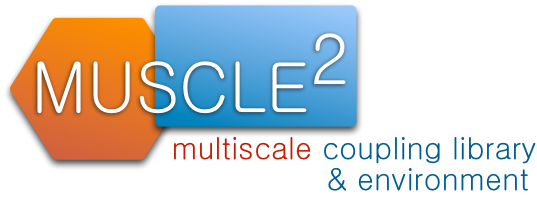Changes between Version 15 and Version 16 of Installation
- Timestamp:
- 04/20/12 17:34:17 (13 years ago)
Legend:
- Unmodified
- Added
- Removed
- Modified
-
Installation
v15 v16 7 7 * added support for generation of OTF trace logs, 8 8 * implemented Port Range traversing technique for cross-cluster execution. 9 9 10 == Dependencies == 11 10 12 The core functionality of the MUSCLE is written in Java. To be able to integrate native code with the MUSCLE, there is also a native part which is written in C++. Bootstrapping and platform independent configuration is done with a flexible setup mechanism written in Ruby. 11 13 12 In order to use the MUSCLE, you need a recent Java runtime . You can obtain it at either http://www.java.com/en/download/index.jsp (Oracle-Java) or http://openjdk.java.net/ (Open-JDK). Main Java third-party dependencies are already provided in the bundle and do not need to be independently installed.14 In order to use the MUSCLE, you need a recent Java runtime, either [[http://www.java.com/en/download/index.jsp|Oracle-Java] or [[http://openjdk.java.net/|Open-JDK]]. Main Java third-party dependencies are already provided in the bundle and do not need to be independently installed. 13 15 14 A Ruby installation can be downloaded from: [[http://www.ruby-lang.org/en/downloads/] (MUSCLE does currently not work with Ruby 1.9.1 or newer). 15 == General Instructions == 16 If the dependencies are in place, you are ready to build and install MUSCLE. 17 Extract the download, e.g. 16 For the command-line interface [[http://www.ruby-lang.org/|Ruby]] is needed. 17 18 To compile and install MUSCLE, the [[http://www.cmake.org/|CMake]] package. For the C++ library, [[http://www.boost.org/|Boost]] is needed. 19 20 === Installation of dependencies on a Debian flavored Linux === 21 22 Run 18 23 {{{ 19 #!div style="font-size: 90%" 20 {{{#!sh 21 $ unzip muscle-1.1.1.zip 22 }}} 23 }}} 24 Change your working directory to the the MUSCLE directory: 25 {{{ 26 #!div style="font-size: 90%" 27 {{{#!sh 28 $ cd muscle-1.1.1 29 }}} 30 }}} 31 Invoke MUSCLE build script with installation (we are installing muscle to the /opt/muscle directory which is default, type ./build.rb for more options): 32 {{{ 33 #!div style="font-size: 90%" 34 {{{#!sh 35 $ ./build.rb install --prefix=/opt/muscle 36 }}} 37 }}} 38 See if MUSCLE is working correctly: 39 {{{ 40 #!div style="font-size: 90%" 41 {{{#!sh 42 $ /opt/muscle/bin/muscle --version 43 }}} 24 sudo apt-get install build-essentials cmake ruby ruby-dev libboost-dev libgemplugin-ruby 44 25 }}} 45 26 46 In case you plan to use MUSCLE with native code, you will have to compile the native library part of MUSCLE using a C++ compiler (such as g++). The build script belonging to MUSCLE also has a target to build the native libraries. This requires a C++ compiler and CMake (http://www.cmake.org/) to be available.27 to install all dependencies at once. 47 28 48 == Installation example - Scientific Linux 5.6 == 29 === Installation of dependencies on Scientific Linux 5.6 === 30 49 31 '''Note:''' Some part of the presented installation procedure requires to be invoked by root. 50 32 … … 101 83 }}} 102 84 103 5. Download the muscle bundle from [[http://apps.man.poznan.pl/trac/muscle/downloads|Downloads section]], e.g. 85 === Installation of dependencies on Mac OS X === 86 87 Most dependencies are installed when installing Xcode. In [[http://itunes.apple.com/us/app/xcode/id497799835?ls=1&mt=12|Xcode 4.3]], the command-line tools are installed by opening Preferences -> Downloads and pressing Install at the item "Command-line tools". For Boost and CMake, download the packages on their website or use an installation manager like [[http://mxcl.github.com/homebrew/|HomeBrew]] or [[http://www.macports.org/|MacPorts]]. 88 89 === Remainder of the installation === 90 91 MUSCLE also requires json, for this 92 {{{ 93 sudo gem install json 94 }}} 95 96 When the dependencies are in place, you are ready to build and install MUSCLE. Download the muscle bundle from [[http://apps.man.poznan.pl/trac/muscle/downloads|Downloads section]], e.g. 104 97 {{{ 105 98 #!div style="font-size: 90%" … … 109 102 }}} 110 103 111 6. Extract the package: 104 Extract the download, e.g. 112 105 {{{ 113 106 #!div style="font-size: 90%" 114 107 {{{#!sh 115 unzip muscle-1.1.1.zip108 $ unzip muscle-1.1.1.zip 116 109 }}} 117 110 }}} 118 119 7. Compile MUSCLE (by default build script recompiles java and c++ stuff): 111 Change your working directory to the the MUSCLE directory: 120 112 {{{ 121 113 #!div style="font-size: 90%" 122 114 {{{#!sh 123 cd muscle-1.1.1 124 ./build.rb 115 $ cd muscle-1.1.1 125 116 }}} 126 117 }}} 127 128 8. Install MUSCLE to the destination: 118 Invoke MUSCLE build script with installation (we are installing muscle to the /opt/muscle directory which is default, type ./build.rb for more options): 129 119 {{{ 130 120 #!div style="font-size: 90%" 131 121 {{{#!sh 132 cd muscle-1.1.1 133 ./build.rb install --prefix=/opt/muscle 122 $ ./build.rb install --prefix=/opt/muscle 134 123 }}} 135 124 }}} 136 137 9. See if the MUSCLE is working: 125 See if MUSCLE is working correctly: 138 126 {{{ 139 127 #!div style="font-size: 90%" 140 128 {{{#!sh 141 /opt/muscle/bin/muscle --version129 $ /opt/muscle/bin/muscle --version 142 130 }}} 143 131 }}} … … 158 146 159 147 ==== Execution ==== 160 To run the sim mulation defined in src/cxa/SimpleExample.cxa.rb use the following command:148 To run the simulation defined in src/cxa/SimpleExample.cxa.rb use the following command: 161 149 {{{ 162 150 #!div style="font-size: 90%"
